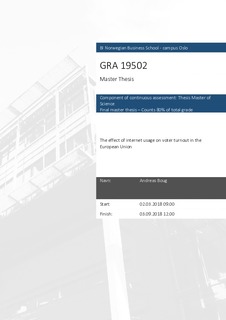The effect of internet usage on voter turnout in the European Union
Master thesis
Permanent lenke
http://hdl.handle.net/11250/2577816Utgivelsesdato
2018Metadata
Vis full innførselSamlinger
- Master of Science [1621]
Sammendrag
This master thesis investigates the effect of internet usage on voter turnout in the
European Union over the sample period from 1990 to 2016. The methodology
applies is both ordinary least squares (OLS) estimation and the fixed effect model
approach, in which the dependent variable is voter turnout and the independent
variable is the internet usage. Both socioeconomic variables such as population,
gender (female) and age, in addition to macroeconomic variables such as GDP per
capita and the unemployment rate are used as a control variable in the regressions.
The main findings suggest a positive and statistically significant effect of internet
usage on voter turnout in the European Union. Moreover, the findings from the
OLS estimation and the fixed effects models only differ slightly, which makes the
simultaneity problem less likely in the empirical analysis. The sensitivity analysis
conducted in this thesis examine the robustness of the main findings by firstly
excluding the female variable as a control variable and secondly by excluding
Belgium and Luxembourg from the data set due to compulsory voting in these
countries. In both cases, the estimated effect of internet usage on the voter turnout
remains positive and huge in magnitude and statistically significant at
conventional levels. That said, all findings reported in this thesis should be
considered with some caution, as more comprehensive sensitivity analysis with
respect to control variables not used in the empirical analysis may be conducted.
Such comprehensive sensitivity analysis has been beyond the scope of this thesis
and is left for future research.
Beskrivelse
Masteroppgave(MSc) in Master of Business - Handelshøyskolen BI, 2018
